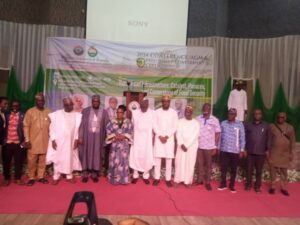
Girl Child Report: Tallen advocates collaboration of stakeholders
By Gloria Akudoro, Abuja.
In her consistent campaign in making the world of women safer, the Minister of Federal Ministry of Women Affairs, Hon. Dame Pauline Tallen, on Thursday has advocated the collaboration of key stakeholders towards eradication of child marriage and upholding the education of girl-child in Nigeria.
Speaking at the opening launching of the ‘Status of the Girl Child Report’ and Disemination of ‘Towards Ending Child Marriage’ campaign in Abuja, the Minister said with collective effort, the plight of Nigerian girls will improve.
Tallen, filled with delight, acknowledged the First Ladies of the States for their unflinching support, notied that most of the worst forms of violence against the girl-child are experienced in our communities.
“I will therefore not be tired in openly thanking our First ladies, whose activities under the Coalition of Governors Wives have raised the bar in our efforts to stem this tide which has gripped our society like a pandemic,” she commended.
She further said, “the issue of the ‘Girl-Child’ is a global agenda and features as the 12th critical area of concern in the 1995, Beijing Platform for Action and are also codified within the U.N. Convention on the Rights of the Child, specifying non-discrimination, protection from harm and abuse, and full participation in family, social, and cultural life.
“The 1999 Constitution (as amended) stipulates that every child (boy and girl) has the right to education. However, the United Nation’s Children’s Fund, UNICEF, report 2017, revealed that there are over 13.5 million children that are not in school and are not receiving any form of training to help them better their lives. Out of these 13.5 million children, the girl child constitutes about 60 percent.”
Tallen further stressed that, “UNICEF report revealed that every year, 15 million girls are married off before they turn 18 years with devastating consequences on their health, education, and wellbeing. The findings also show that 15 out of the 20 countries with the highest rates of child marriage are in Africa, and that Nigeria is second to India in terms of Child Marriage. These statistics specifically point to the fact that;
“i. Nigeria has the highest child marriage prevalence in Sub Saharan Africa with about 23 million girls and women married in childhood.
“ii. In 2015, an estimated 6 million girls were married by age 15 and 36 million girls were married by age 18 nationwide.
“iii. Nigeria’s out-of-school population is the largest in the world. Out of the about 13 million out-of-school children in Nigeria, the majority are girls.
“iv. Only about 2 percent of 15–19-year-old married girls are in school, and three out of four married girls cannot read at all.
“v. Premature pregnancy, indicators on maternal health, education, food security, poverty eradication, HIV/Aids and gender inequality are all negatively linked with child marriage.”
The Minister expressed her concern at these troubling developments, but emphasized that they had been able to prioritize the issue of female child which resulted in the establishment of a Girl Child Division led by a Deputy Director of the ministry.
According to her, the Ministry is currently spearheading the campaign to end Child Marriage which was launched in November, 2016 by Vice President, Yemi Osinbajo, along with the National Strategic to end Child Marriage in Nigeria from 2016 to 202. Adding that, it’s a strategic framework and action plan for implementing programmes and activities to end child marriage in the country.
“Prioritizing Girl-Child Education as a spring board to address the challenges confronting the society has enabled us to step up advocacy with both Chambers of the National Assembly, State Governors and the State Assemblies. This has led to remarkable progress made with the Violence Against Persons Prohibition (VAPP) Act 2015.
“As at today, 30 States that have domesticated it, with more promising to follow this trend before the end of the year. It is unfortunate that since the passage of the Child Rights Act in 2003 only 26 States that have domesticated it, with 10 states still outstanding. All hope is not lost as we have the commitment of these States to do the needful. We are closely monitoring,” Tallen emphasized.
The Minister who spoke on the alarming rate girls who still use unhygienic materials instead of sanitary pad, said through the launched campaign to support female child education, has exceeded the one-Million Girls Pad Distribution with support from Water Supply & Sanitation Collaborative Council (WSSCC), Procter & Gamble, WaterAid, USAID, Soroptimist International and other partners buying into it.
She said, “We also launched the Emergency Sanitary Pad Bank project which consists of basic sanitary pads, panties, soaps and sanitizers that can support a girl-child to stay in school, even during her menstrual period. I call on all stakeholders to key into this initiative.”
Tallen further expressed that in realizing the importance educating the Girl Child which leads to poverty reduction, better family health, economic growth and lower rate of child mortality and malnutrition, the President Buhari had directed the Ministry to partner with the Education Ministry to accelerate the enrolment, retention and completion rates of girls in primary and secondary schools.
“Therefore, we must see Education as the key to unlocking access to economic and social opportunities for millions of girls around the world. Educated girls will grow to become women who are empowered to care for themselves, their families, and their communities and the dividends of investing in girls’ education are immeasurable. It does not only bring the immediate benefit of empowering the girl child, but it is seen as the best investment in a country’s development,” the Minister said.
She therefore, enjoined the Hon. Commissioners of Women Affairs to work hand-in-hand with the State Ministries of Education, State Universal Basic Education Board (SUBEB) and Civil Society Organizations (CSOs) to ensure enrolment, retention and completion of basic education for the girls in your respective States.
In his remarks, the Chief Child Protection Officer, UNICEF, Ibrahim Sese, said through the project called “Towards Ending Child Marriage (TECM),” he had been able to work hand-in-hand with two States Ministry of Women Affairs and Social Development, State House of Assembly, CSO partners, children, faith leaders, among others, towards the domestication of Child Protection Bill by Katsina State House of Assembly.
He, however, felicitated with the Katsina State House of Assembly and His Excellency, the Executive Governor, for passing and gazette-ing the Bill.
Sese said, “The most recent big win of the project is the comprehensive study on ‘The State of the Nigerian Girl Report: an inclusive diagnosis of child marriage in Nigeria’ that we have come together to launch and disseminate today.
“The report or the study itself is not the final result we are anticipating, however, the translation and adoption of the key findings and recommendations to be used as an input to National and State level policy, strategy and costed plan development towards ending child marriage in particular and child poverty in general.”
According to Sese, the Nigerian Girl Child Report highlights the dismal state of Nigerian female child at the national level, its detrimental influence on education and empowerment, evidence-base gaps in social cultural beliefs and systems and the solution for closing the child marriage gap.
“The report reveals that various cultural, traditional and social practices encourage gender-discriminatory norms against girls and women. Negative social norms condition parents and girls to accept child marriage as a normal way of life to come out of poverty.
“Evidence also shows that there is a clear and strong link between Child Early Forced Marriage (CEFM) prevalence and endemic poverty, poor education outcomes, school dropout rates, a high rate of out-of-school children, and poor access to basic social, economic and healthcare services. Despite the Compulsory Free and Universal Basic Education Act of 2004, lack of access to quality, free, safe, uninterrupted and inclusive education for girls remains a big driver of child marriage,” he stated.
The UNICEF Chief disclosed that early forced marriage is a human right violation and a form of gender-based violence (GBV), robs children of their ability to make decisions about their lives, leads to disruption of their education and make them more vulnerable to violence and discrimination, prevent their full participation in economic, political and social spheres.
He added that ‘Save the Children’ calls for policies and strategies to end child marriage to be developed and implemented fully.
“Save the Children commends the commitment to invest in digital learning; and implementing monitoring mechanisms to ensure realization of commitments, among others, It is not debatable that the timely and collective implementation of these commitments will transform girls education in Nigeria.”
Sese who expressed that President Muhammadu Buhari’s recent commitment at the Global Partnership for Education (GPE) Conference was been welcomed by Save the Children International Nigeria, noted that the GPE Conference was to accelerate education funding to 22.504 by the year 2025, that is, 14 percent in 2022; 16.7 percent in 2023; 20 percent in 2024; and 22.5 percent by 2025.
“In addition to the domestic budgetary increase, we are also very pleased to learn the government’s commitment to ensure that States and their local government areas progress towards or maintain spending levels to be at 20 percent of total budget, increased equity and efficiency in the use of State Universal Basic Education Board funds to cater for proactive teacher training programmes; and update national minimum standards for education outcomes,” he said.
He called on both FG and States government to prioritize the adoption and enforcement of the Child Rights Act (2003) which provides children with the necessary legal policy framework for seeking justice when their rights are denied or abused. While the domestication of CRA is a very critical step to stopping the war on girls, it should also be backed by appropriate financial and human resources for its full implementation such that it provides a favourable environment in which children can realize and release their full potentials.



